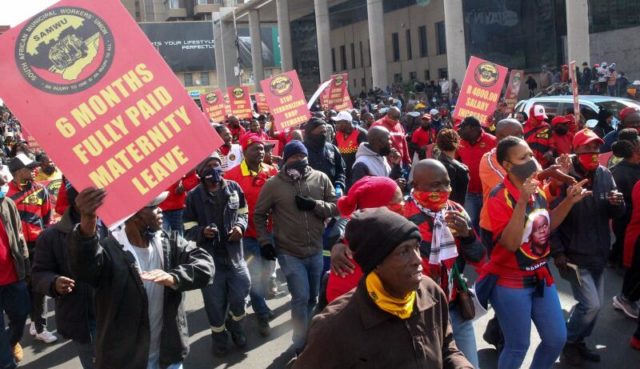The two parties have not seen eye to eye as the union accused Salga of negotiating in bad faith.
Pretoria – The South African Local Government Association (Salga) and the South African Municipal Workers’ Union (Samwu) are at loggerheads as wage negotiations for all 257 municipalities collapsed and the union prepares for a nationwide strike.
Spokesperson for Salga Sivuyile Mbambato said that the municipalities opposed the union’s decision to take negotiations to the streets because such an action would end labour peace, stability and interrupt service delivery.
He said Samwu prematurely declared a negotiations deadlock while representatives of the municipalities were confident that an agreement would be reached.
This was after the facilitator at the South African Local Government Bargaining Council proposed a 4% across the board salary increase linked to a multi-year agreement that was declined by all parties.
The two parties have not seen eye to eye as the union accused Salga of negotiating in bad faith and having come to the table already instructed by the municipalities not to offer an increase and benefits in the interest of the workers.
Salga, however, feels a strike right now would not serve any good and it noted with disappointment Samwu’s decision to pull out of negotiations despite a potential consensus being reached.
Mbambato said: “Salga opted for Section 74 referral in terms of the Labour Relations Act due to the fact that all municipalities perform the designated essential services.
“Employees in the designated essential services are prohibited from participating in strike action in terms of the Labour Relations Act.
“In these circumstances, the dispute can only be resolved through interest arbitration as opposed to strike action.”
However, Samwu deputy general secretary Dumisane Magagula said the union noted Salga’s stance with great discomfort and agitation.
He said the union has officially filed its papers to the South African Local Government Bargaining Council declaring a dispute and as such a dispute resolution mechanism should be followed.
He said: “They (Salga) have, from the onset, negotiated in bad faith, telling workers that their principals at municipalities have mandated them to not give workers an increase that is above inflation and workers’ benefits that are linked to salaries should be frozen.
“The Samwu negotiation team was told on July 1 by Salga that “you can do whatever you want, including going on strike but there is no way that we are going to budge on our position.”
“For us they were not willing to compromise on anything throughout the negotiations, yet they expected workers to continually revise their demands whereas there was no reciprocation on their part.”
Samwu argues that Salga could not out of the blue argue that municipal workers are essential service workers when it suited them.
“Why were municipal workers not considered an essential service when they were denied a Covid-19 allowance? Why were these same workers not deemed to be essential service workers when other workers are busy getting the Covid-19 vaccinations, leaving municipal workers exposed and vulnerable? Most importantly, why are municipal workers not considered an essential service when they demand decent salary and wage increases?” asked Magagula.
The union had an original demand for a single year salary and wage agreement; R4 000 salary increase for all workers under the auspices of the bargaining council; R15 000 sectoral minimum wage; and a R 3 500 housing allowance for all workers.
This included a 80% employer medical aid contribution and 20% employee contribution; six months fully paid maternal leave and one month fully paid paternity leave; a 25% employer contribution towards pension; absorption of all Expanded Public Works Programme and Community Work Programme workers in municipalities; and the rationalisation of pension funds in the sector.
Pretoria News








